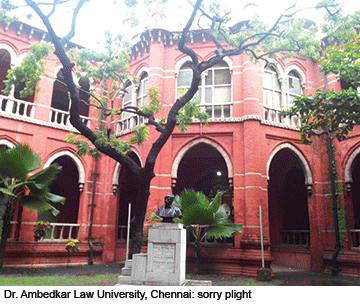A bill prohibiting the promotion of private law colleges tabled in the Tamil Nadu state legislative assembly, has drawn strong criticism from lawyers, and judges across the state.
 According to the preamble of The Tamil Nadu Establishment of Private Law Colleges (Prohibition) Bill (TNEPLC (P) B) tabled in the assembly on July 30, “… past experience reveals that private trusts/societies are not able to provide legal education at affordable cost to the economically and socially weaker sections and are also not able to continue to run the law colleges successfully. The government has, therefore, decided to prohibit the establishment of law colleges by private persons in the state.”
According to the preamble of The Tamil Nadu Establishment of Private Law Colleges (Prohibition) Bill (TNEPLC (P) B) tabled in the assembly on July 30, “… past experience reveals that private trusts/societies are not able to provide legal education at affordable cost to the economically and socially weaker sections and are also not able to continue to run the law colleges successfully. The government has, therefore, decided to prohibit the establishment of law colleges by private persons in the state.”
Predictably, the reaction of the legal community to the Bill has been swift. The Advocates’ Forum for Social Justice, represented by its president, K. Balu filed a public interest litigation challenging the Bill in the Madras high court on November 19, contending that the object of the TNEPLC (P) Bill is contrary to the Constitution, the Advocates Act 1961 and the public interest.
Currently, the Delhi-based Bar Council of India (BCI) established under the Advocates Act, 1961, regulates legal education and practice in India, prescribes standards and grants recognition to law colleges and universities. Within the state, the Tamil Nadu Bar Council enrols candidates with degrees from BCI-recognised institutions as advocates entitled to practice law in legally constituted courts in the state.
The indignation of the legal community has been aroused because opportunities for availing good quality legal education in Tamil Nadu are very limited. Currently, aspiring law students have the option to enroll in government law colleges in Chennai, Coimbatore, Madurai, Tiruchy, Tirunelveli, Vellore and Chengalpattu, and a School of Excellence in Chennai, all of whom are affiliated with the Tamil Nadu Dr. Ambedkar Law University. Moreover, there’s one National Law School in Srirangam district and only one private law college — the Central Law College, Salem, established in 1984.
In sharp contrast, of the 1,000 law colleges in India, 800 are privately promoted institutions. Moreover, compared to Tamil Nadu’s 14 law colleges, there are 30 law colleges in Kerala, 65 each in Andhra Pradesh/Telangana and Karnataka and 150 in Uttar Pradesh.
“Since Tamil Nadu does not have an adequate number of law colleges, thousands of students are obliged to study law in neighbouring states. Therefore, the state government should encourage rather than prohibit private law colleges. Moreover, the state government’s argument that private law colleges should provide quality education at affordable cost is also flawed. Government-run National Law schools across the country levy market-related tuition fees to provide good quality education,” says Justice K. Chandru, a former judge of the Madras high court.
Implicit in the legislation banning the promotion of private law schools in Tamil Nadu is the promise that the state government itself will promote greenfield legal education institutions. But members of the legal fraternity are skeptical about the state government’s capability to establish acceptable quality law colleges given the sorry plight of the seven government law colleges. Violent caste-based clashes are common on these colleges’ campuses and the syllabus of the Dr. Ambedkar Law University has not been updated since 1997. Student reports indicate very few books in the library and teachers holding classes at their convenience.
It’s against this dismal condition of government law colleges that the legal community has questioned the wisdom of the state government’s decision to impose a blanket ban on the promotion of new private law colleges, while giving free rein to private engineering and medical colleges to set up shop. Currently, Tamil Nadu boasts 554 engineering colleges, 22 private medical colleges, 700 private teacher training institutions and 600 nursing schools.
“The state government has no legislative competence to ban the promotion of private law colleges. The TNEPLC (P) Bill won’t stand up to judicial scrutiny because only the Bar Council of India has the authority to permit the establishment of private colleges and regulate their operations,” says senior advocate, K.M. Vijayan.
Although there’s a shortage of law colleges in the state, the ruling AIADMK government seems determined to enact the TNEPLC (P) Bill, leaving even legal experts in doubt about its real motivation and objectives.
Hemalatha Raghupathi (Chennai)























